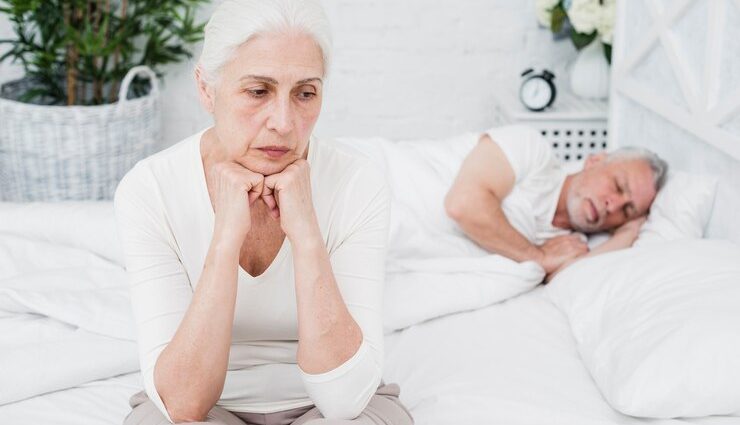Sexual desire problems in women are more common after menopause. This suggests that menopause may reduce libido. The decrease in estrogen levels that occurs after menopause may decrease arousal and make sexual intercourse more painful.
Menopausal and postmenopausal women may notice that they don’t get aroused as easily and that they have lost sensitivity. That can lead to a decreased interest in sex. Additionally, these lower estrogen levels can cause a decrease in blood supply to the vagina. In turn, that can decrease vaginal lubrication.
In this article, we will see how menopause can affect a woman’s sexual desire and what can be done to improve libido in these cases.
Menopause and libido
The symptoms of menopause can hurt a couple’s relationship, as it can cause physical and emotional changes that affect a woman’s life, including her sex life.
Some symptoms and side effects associated with menopause include anxiety, bladder control problems, decreased sex drive and desire, depression, difficulty sleeping, and weight gain, among others.
This can affect a woman’s quality of life and relationship with her partner, as well as her relationship with herself, since self-esteem problems may arise as a result of all these changes.
It is important to clarify that not all postmenopausal women have problems with decreased libido and sexual desire. Even a small percentage experience improvements in their libido.
This may be due, among other factors, to the fact that there is less anxiety about sexual relations associated with a possible pregnancy. In addition, many postmenopausal women often have fewer parenting responsibilities, which allows them to relax and enjoy intimacy with their partners.
In any case, women who go through menopause and report decreased libido do so for different reasons. According to a study conducted by the Department of Obstetrics and Gynecology at Geisinger Medical Center in Danville in 2012, reported rates of sexual problems in postmenopausal women are between 68 and 86.5 percent. This range is much higher than that for all women in general, which is estimated to be between 25 and 63 percent.
Why does menopause affect sexual desire?
Decreased estrogen levels can reduce blood flow to the vagina, which can cause the tissues in the area, including the labia, to become thinner, making them less sensitive to sexual stimulation.
Decreased blood flow also affects vaginal lubrication and overall arousal. As a result, a woman may not enjoy sex as much and may have difficulty reaching orgasm. Additionally, sex may be uncomfortable or even painful.
Fluctuating hormone levels during perimenopause and menopause can also affect a woman’s mental health, which in turn can cause a decrease in her libido.
Stress can also affect sexual desire after menopause. This condition often coincides with personal and work circumstances that “complicate” daily life, such as problems with teenage children, caring for the elderly, increased work responsibilities, etc.
The changes in hormone levels a woman may experience during menopause promote irritability and increase the risk of depression, so dealing with everyday stress can be even more difficult.
Additionally, according to an article published in the Journal of Women’s Health, women who have more significant side effects associated with menopause are more likely to have lower libido levels. Some examples of these side effects include hot flashes, depression, anxiety, sleep problems, and fatigue.
Other factors that make a woman going through menopause more likely to experience a reduction in sexual desire include the incidence of chronic diseases, smoking, or low levels of physical activity.
Improving sexual desire after menopause
There are several actions a woman can take to increase her libido, including medical treatments, lifestyle changes, and some home remedies.
If there are changes in vaginal tissue, such as thinning and dryness, estrogen-based medical treatment may be considered. One study found that women who used hormone therapy reported higher levels of sexual desire compared to women who did not.
However, the use of estrogens does not guarantee an increase in sexual desire. On the other hand, most women can benefit from the use of water-soluble lubricants during sexual intercourse.
Another option is to go to a therapist who specializes in sexual dysfunction. Regarding this possibility, it is important to note that the effects of this type of therapy usually improve when the couple participates.
Additionally, increasing daily physical activity can help reduce symptoms related to menopause, including reduced sexual desire. Eating a healthy diet can also improve your overall sense of well-being and benefit your libido.
There are also natural supplements on the market to try to increase libido. However, it is advisable to carefully review these supplements and make sure that they do not interact negatively with other medications or treatments or that they do not have side effects and/or contraindications, so it is important to consult with your doctor before taking any supplement, no matter how “natural” it is (or is promoted).
